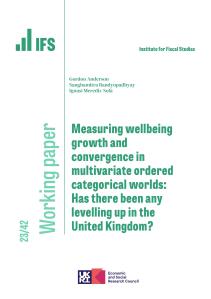A son can bear with equanimity the loss of his father, but the loss of his inheritance may drive him to despair. That may be a little strong even for the most hard bitten of cynics, but Niccolo Machiavelli’s words are more relevant today than at any time in living memory. Rising house prices, growing wealth and stagnant earnings mean that inheritances are becoming ever more important in determining life chances and lifetime income. Relative to other sources of income, inheritances are likely to be about twice as important to the generation born in the 1980s as they were for those of us born in the 1960s. That trend looks set to continue.
Given all the publicity afforded to house prices, and indeed to the increasing divergence in fortunes between the wealthy baby boomers and their struggling children and grandchildren, this might not come as a great surprise. Nevertheless, it is the reversal of a trend which stretched for most of the 20th century, a century during which one’s own efforts became more important relative to inherited wealth. Reward for effort and talent is on the wane as the power of the brute luck of family wealth reasserts itself.
It is bad enough that parental background is such a strong determinant of educational and labour market success. But at least we all have some individual responsibility for how well we progress, even if some have much better chances than others. Our inheritances we cannot control. And as a new report published today by my colleagues at the Institute for Fiscal Studies shows, these inheritances are likely to play an increasingly important role in constraining social mobility.
Here is one remarkable statistic. It looks likely that for people born in the 1980s whose parents were in the top fifth of the wealth distribution, their inheritance could increase their lifetime income by nearly 30 per cent. For every pound they earn, or receive in pensions and benefits, they’ll get nearly 30p of inheritance. Despite the fact that their incomes are much lower on average, those born at the same time but with parents in the bottom fifth of the wealth distribution are likely to receive inheritances that add only 5 per cent to their lifetime income.
Already, for the 1960s generation, it looks as if about a quarter of the difference in lifetime living standards between those with rich and poor parents is being driven by inheritance. For those born in the 1980s that’s likely to rise to a third.
The real winners here are the poor children of rich parents. For them inheritance will be especially important. It effectively insures them against bad luck, lack of talent, or sloth. No such safety net for the more numerous poorer children of poorer parents. For the rich children of rich parents, meanwhile, inheritance is just another bonus along the way, a bonus that will serve to exacerbate already growing inequalities.
It is true that most bequests won’t be received until relatively late in life. That may be one reason why younger generations are increasingly likely to say they will be relying on inheritance to fund their retirement. But that doesn’t mean the prospect of receiving a nice windfall later on has no effect during working life. Being able to rely on an inheritance to fund your retirement means you can take more risks. You can save less and spend more now, notwithstanding the risk that, for an unlucky minority, social care costs may punch quite a hole in what they eventually end up receiving.
As ever, policy and policy concerns lag behind. As a society we remain addicted to handing out freebies to the old, now the richest generation alive. We seem set on maintaining high house prices and, through stamp duty and council tax, locking the older, wealthier generation into bigger and more expensive houses. And we seem to have an entirely separate concern about social mobility, treating it as though it has nothing to do with unearned wealth. That might not have been too terrible a simplification a generation or two ago. Today, though, inheritance is a big and growing barrier to the social mobility that virtually all politicians say they favour.
So what to do? One route of course is to improve the working of inheritance tax. That might not mean increasing it. It could actually mean reducing the rate and broadening the base as a way of increasing effectiveness and reducing avoidance. Both historical and international experience, though, suggests this will only ever have a limited effect. There is plenty else to do on the taxation of housing and pensions and capital gains, all of which are currently designed to benefit the wealthier and older generations, and hence those in the younger generation who have wealthy antecedents. If and when this government does eventually decide to get to grips with the growing catastrophe that is social care funding, then it needs to make sure that the costs are paid by the older and wealthier. It just needs to make sure the costs are spread among them rather than borne entirely according to the random bad luck of who happens to need long-term and expensive care.
The most important change we need, though, is on the other side of the coin. Inheritance is becoming more important in part because wealth is growing. But it is also becoming more important in determining lifetime living standards because earnings have been, at best, stagnant for more than a decade. Unless we can get productivity, earnings and incomes growing as they used to in the 20th century we are likely to continue to regress towards a 19th-century settlement in which inheritance becomes ever more important in determining our place in society.








